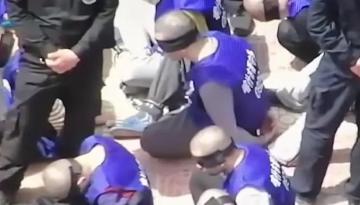The United States intensified its economic pressure on China's Xinjiang province on Friday, imposing sanctions on a powerful Chinese company and two officials for what it said were human rights abuses against Uighurs and other ethnic minorities.
The move, the latest blow to US-China relations, came a week after US President Donald Trump closed the Chinese consulate in Houston, prompting Beijing to shutter the US consulate in Chengdu.
The US Treasury Department said in a statement it blacklisted the Xinjiang Production and Construction Corps, also known as XPCC, along with Sun Jinlong, former party secretary of XPCC, and Peng Jiarui, XPCC's deputy party secretary and commander, over accusations they are connected to serious human rights abuse against ethnic minorities in Xinjiang.
"The Chinese Communist Party's human rights abuses in Xinjiang, China against Uyghurs and other Muslim minorities rank as the stain of the century," US Secretary of State Mike Pompeo said in a statement.
China denies mistreatment of the minority group and says the camps holding many Uighurs provide vocational training and are needed to fight extremism.
Washington's action freezes any US assets of the company and officials; generally prohibits Americans from dealing with them; and bars Sun Jinlong and Peng Jiarui from traveling to the United States.
A senior administration official, speaking on condition of anonymity, described the company as a "a secretive, paramilitary organization that performs a variety of functions under the direct control" of the ChinEse Communist Party (CCP).
"They are directly involved in the implementation of the CCP's comprehensive surveillance, detention and indoctrination ... which we all know targets the Uighurs and members of other ethnic minority members in Xinjiang," the official said.
The Treasury also issued a license, authorizing certain wind-down and divestment transactions and activities related to blocked XPCC subsidiaries until Sept. 30.
Washington recently imposed sanctions on the autonomous region of Xinjiang's Communist Party Secretary Chen Quanguo, the highest-ranking Chinese official to be targeted, blacklisting the member of China's powerful Politburo and current first party secretary of the XPCC, as well as other officials and the Xinjiang Public Security Bureau.
Peter Harrell, a former official and sanctions expert at the Center for a New American Security, said that from an economic perspective, Friday's action was a "substantial escalation" of US pressure and sends a warning to companies engaged in activity in China.
"The Trump administration finally took a meaningful sanctions ... action on Xinjiang, as opposed to ones that were primarily symbolic," Harrell said.
XPCC is a quasi-military group created in 1954. It was initially made up of demobilized soldiers who spent time in military training while developing farms on the region's arid land.
Civilian members from eastern China later joined the corps, which now numbers 3.11 million people, or more than 12 percent of the region's population. It is almost entirely made up of Han Chinese in a region that is home to the Muslim Uighur people.
Reuters


